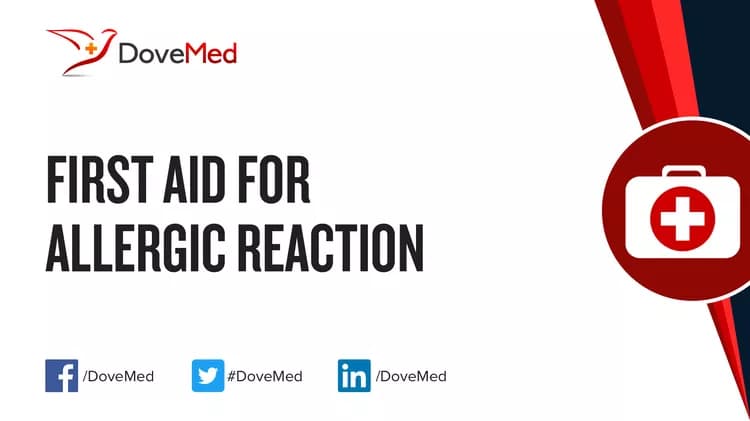What is Allergic Reaction?
- An Allergic Reaction may be described as an oversensitivity of the body to certain substances that it comes into contact with. These substances are known as allergens and the exposure to these substances may occur via ingestion, inhalation, or through physical contact with the body
- There are a host of allergens and these may vary from one individual to another, meaning that specific individuals are allergic to certain specific substances. The Allergic Reaction is caused by an overactive immune system of the body
- In many cases, the condition is mild and gets resolved on removal or stoppage of exposure to the allergen. A severe form of allergic reaction is termed anaphylaxis, which is a potentially life-threatening condition. It can occur within seconds or a few minutes of exposure to the allergen
What are the Causes of Allergic Reaction?
The causes of Allergic Reaction include:
- Stings from insects including bees or wasps
- Use of medications (such as penicillin)
- Consuming foods such as tree nuts, roots, fish, shellfish, eggs, and peanuts
- Exposure to certain plants, grass
What are the Signs and Symptoms of Allergic Reaction?
The signs and symptoms of an Allergic Reaction may vary from one individual to another. It may be mild in some, and severe in others. The type of allergen and the method of exposure also dictates the body system affected and the type of symptoms observed. The signs and symptoms may include:
- Skin rashes, itching, redness, burning sensation; hives
- Conjunctivitis-like symptoms that include eye irritation, watery eyes, redness and pain
- Nasal congestion, runny nose
- Nausea and vomiting
- Stomach or abdominal pain
- Breathing difficulties, caused by constriction of airways; wheezing
- Chest pain or tightness
- Swelling of the face, eyes, lips, tongue, or throat
- Weak and rapid pulse
- Trouble speaking or swallowing
- Dizziness or fainting
- Unconsciousness
How is First Aid administered for Allergic Reaction?
First Aid tips for Allergic Reaction:
- In case of symptoms from a mild or moderate reaction:
- Try to calm the individual
- Limit further exposure to the substance, if possible
- Remove the individual from the area (if exposure occurred through inhalation)
- In case of skin symptoms, such as a skin rash, apply a cold compress
- Use a suitable over-the-counter topical application (hydrocortisone cream) for skin conditions
- DO NOT give food to eat or water to drink, if there is a breathing difficulty
- In case of symptoms from a severe reaction:
- Call 911 (or your local emergency number)
- If available, use injectable epinephrine (Epipen) as directed
- Ensure that the individual does not drink or eat anything
- Loosen tight clothing
- Turn the individual onto their side, to prevent them from choking, if there is vomiting or bleeding from the mouth
- Cover him/her with a blanket and keep them warm; this may help avoid shock
- Make him/her lie still on their back, slightly elevating their feet
- If the individual is not breathing, begin and continue CPR until the paramedics arrive (if you are trained to do so)
- Seek emergency treatment, even if the symptoms improve
Who should administer First Aid for Allergic Reaction?
Any individual around the victim may begin to administer First Aid; however, a medical professional is required for further treatment.
What is the Prognosis of Allergic Reaction?
The prognosis of Allergic Reaction depends on numerous factors including:
- The type of allergen involved
- The time and level of exposure
- The severity of the symptoms
- Whether it is a first exposure incident, or multiple such incidents have taken place
In many cases, the condition is easily managed by limiting further exposure of the individual to the allergen and providing adequate medical treatment. Rarely, the Allergic Reaction may be severe (termed anaphylaxis), and in such cases, the prognosis may be guarded.
How can Allergic Reaction be Prevented?
A few helpful tips to prevent Allergic Reaction:
- Avoid known allergens
- Wear a medical ID tag or bracelet (if you are severely allergic to any particular substance)
- Carry epinephrine injections (epipen) with you
What are certain Crucial Steps to be followed?
- Keep away from known substances that trigger allergic reactions
- Carry a prescribed epinephrine injection (epipen) and oral antihistamine (an allergy medication, such as diphenhydramine or Benadryl), if there is a history of any type of severe allergic reaction
Related Articles
Test Your Knowledge
Asked by users
Related Centers
Related Specialties
Related Physicians
Related Procedures
Related Resources
Join DoveHubs
and connect with fellow professionals


0 Comments
Please log in to post a comment.